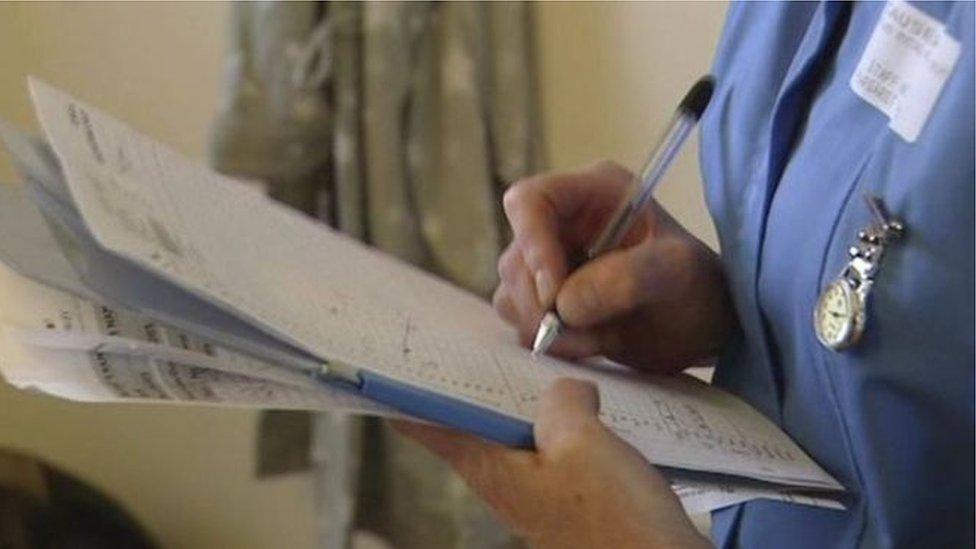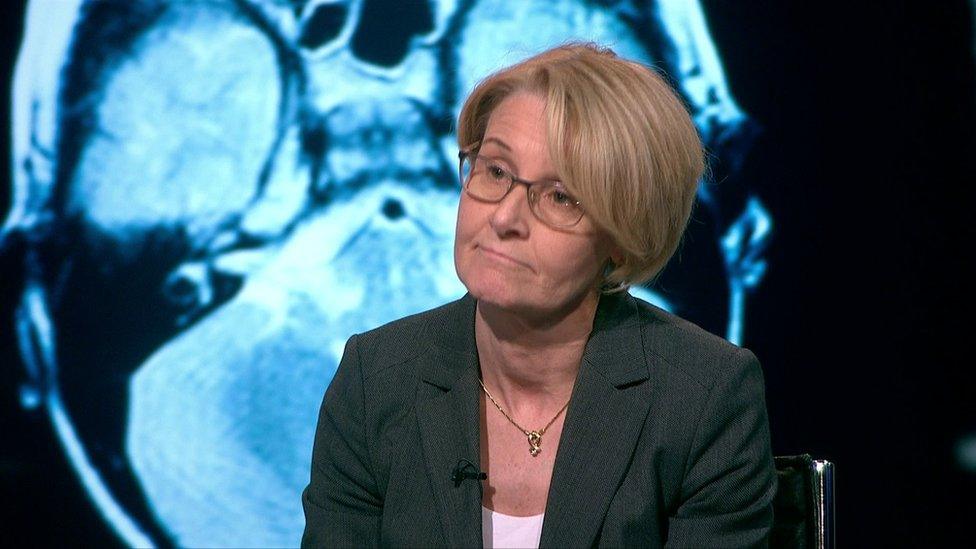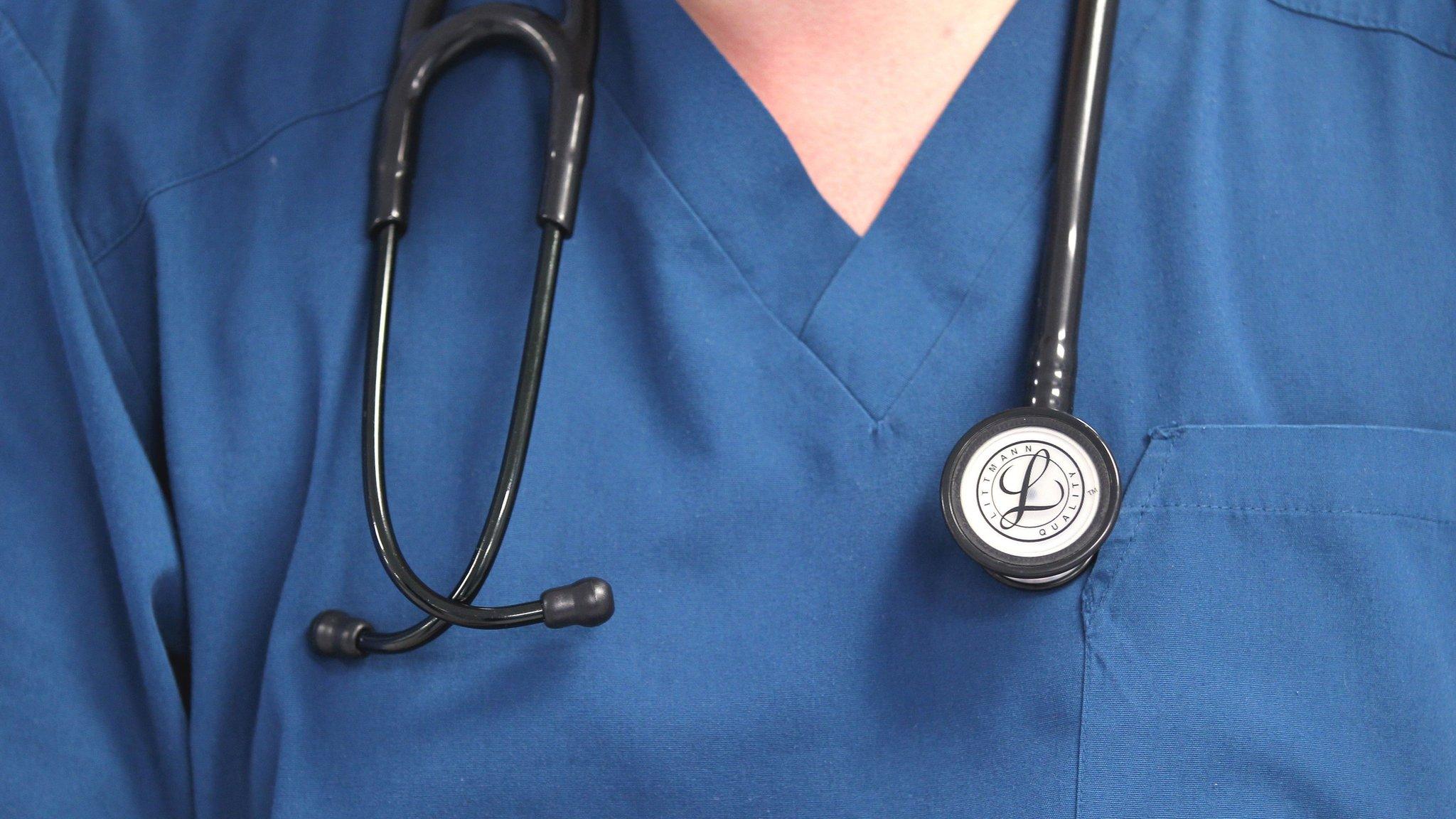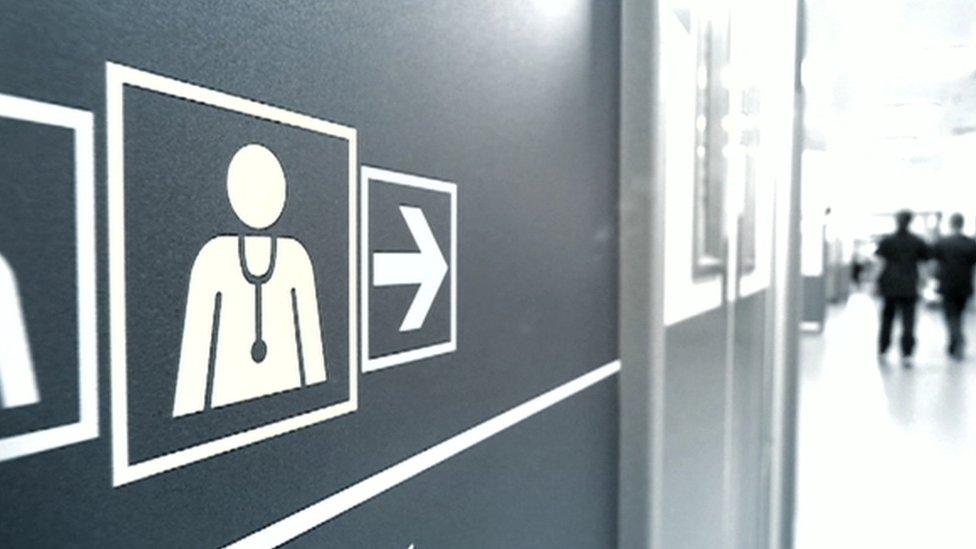Dr Michael Watt patient recall: What we know so far
- Published

The number of recalled patients may still increase further
More than 3,000 neurology patients in Northern Ireland, including children, are being recalled for a review amid concerns some may have been misdiagnosed by Dr Michael Watt.
Letters were sent out to the patients following a year-long independent investigation by the Royal College of Physicians.
The number of recalled patients may still increase further.
It is the biggest ever patient recall in the Belfast Health and Social Care (HSC) Trust.
The Belfast Trust said two locum consultants had been recruited to replace Dr Watt. Clinics began on Saturday 5 May.

Who is Dr Watt?
Dr Watt is a consultant neurologist at the Royal Victoria and City hospitals in Belfast, and also treated patients at private clinics.
He qualified in medicine in 1985 from Queen's University, Belfast and specialised in neurology in June 1996.
Up until June 2017, he was one of 10 consultant neurologists working for the Belfast Health and Social Care Trust.
Dr Watt, who is in his 50s, treats patients with neurological conditions - including Parkinson's disease, epilepsy, multiple sclerosis (MS), stroke and motor neurone disease (MND).
The Ulster Independent Clinic said that Dr Watt operated a private practice but he voluntarily suspended it in June 2017.
He is not currently treating patients, but remains a paid employee of the trust.
What happened?
Concerns about potential misdiagnoses of Dr Watt's patients were formally raised in December 2016 by a GP.
The trust said that patient safety measures were immediately put in place which included restrictions on aspects of Dr Watt's practice.

On 18 May the Department of Health said 3,200 people had now been recalled
The final report from the Royal College of Physicians was sent to the trust on Thursday 26 April.
The trust recalled 2,500 patients on 1 May "to assure them, their families and ourselves that they are receiving the best possible care".
On Wednesday 2 May, the Department of Health (DH) said it would review governance of outpatient services in the trust with a "particular focus" on neurology.
On 18 May the Department of Health said 3,200 people had now been recalled.
Who is affected?
The patients affected had attended Dr Watt's clinics at the Royal Victoria Hospital in Belfast and, privately, at the Ulster Independent Clinic and Hillsborough Private Clinic.
Some patients are as young as 14, but it is not yet known how many children are involved.
The trust has not ruled out the possibility that some of those affected may have died.
What do you do if you're affected?
An advice line has been set up by the Belfast Trust - the number is 0800 980 1100.
For anyone who saw Dr Watt at Hillsborough Private Clinic, the number is 028 9268 8899.
The Ulster Independent Clinic is taking calls through its helpline, on 028 9068 6511.
Who raised concerns?
SDLP deputy leader Nichola Mallon met the chief executive of the Belfast Health and Social Care Trust on Friday, 4 May.
Ms Mallon said she was in contact with the trust in December 2017 and wanted to know why action was not taken sooner.
After the meeting, she said she understood the Department of Health was first made aware of the Belfast Trust's concerns about Dr Watt in February 2017.
She added that she has received assurances from the trust that its representatives will meet patients face to face to explain what has happened.
"I do have concerns about checks and balances, or the lack thereof, and I think that needs to be addressed," she said.

Meanwhile, Sinn Féin's health spokesman Pat Sheehan said he was aware of another official complaint made to the General Medical Council in 2011, from one of Dr Watt's private patients.
"I'm concerned here that there is a lack of communication between the trusts and the independent sector," he said.
The documents he is referring to have been seen by the BBC.
A non-executive director of the Health and Social care Board said last week that she had raised concerns about Dr Watt's work in 2011.
Melissa McCullough, who is a non-executive director for the Health and Social Care Board NI, told the Belfast Telegraph she had made an official complaint after Dr Watt incorrectly diagnosed her with multiple sclerosis (MS) instead of neurological Lyme disease in 2010.
Her complaint was lodged with the Belfast Health trust in 2011, according to the Belfast Telegraph.
Meanwhile, the Ulster Independent Clinic revealed on 4 May that it had not yet been able to access patient records of Dr Watt.
In a statement explaining that, as an independent clinical practitioner who used its facilities, "Dr Watt retains his own patient records".
The statement said the clinic had sought advice "on obtaining access to the information required from these files urgently to allow us to accurately identify any patients who may need to be contacted".
What happens next?
'We have never been involved with a recall of this scale'
The health department's permanent secretary, Richard Pengelly, said the top priority was ensuring the Belfast Trust promptly completed the recall process, so all of Dr Watt's patients are reviewed to ensure their diagnosis is appropriate and they are receiving the right type of treatment
The trust is running 200 additional clinics - from Saturday 5 May - at which nine neurology consultants are assessing affected patients. Some of these are being held in private clinics.
On 8 May, the trust said 105 patients attended appointments over Saturday and Sunday and, to date, they had booked appointments for just over 2,000 patients.
It said anyone who has been recalled will be given a full clinical assessment by a consultant neurologist within the next 12 weeks.
Dr Mark Mitchelson, who is responsible for neurosciences at the trust, said: "While we hope this will affect a very small number of patients, the change in diagnosis could potentially be very significant."
The General Medical Council has said it will investigate the misdiagnosis concerns.
The Department of Health has also asked for a review of the records of all patients or former patients of Dr Watt who have died over the past 10 years.
The department said on 4 May the review would be "far reaching and will examine all relevant matters including past complaints and how those were handled - there will be no parameters set in relation to how far back this review will cover".
Further details and arrangements for this work will be announced over the next two weeks.
On 10 May, the Department of Health announced that an independent inquiry has been set up to review the recall of the patients by the Belfast Trust.
The inquiry panel will be chaired by barrister Brett Lockhart QC.
It will examine the actions taken by the trust after concerns were raised and whether or not there were grounds for "earlier intervention".

Dr Cathy Jack said the concern about Dr Watt was around documentation and clinical record keeping
A spokesperson for Belfast Trust said the review of the 2,500 patients was from Dr Watt's current active patient list which dates back seven years.
The trust added that any patients who had been treated by Dr Watt prior to 2011 should contact the advice line if they had any concerns.
The medical director of the Belfast Trust, Dr Cathy Jack, said complaints had been reviewed over the last seven years and there was "no red flag" in relation to the complaints and "in particular none around his diagnosis and treatment".
She said the concern that had been raised was about "documentation and clinical record keeping".
What the patients are saying
Many patients have praised Dr Watt's bedside manner, but admitted to being concerned about his workload.
Some patients say their misdiagnosis has led to frustration and anger.
Read more here: Belfast recall patients speak out

Are you one of the patients being recalled for a case review? Email haveyoursay@bbc.co.uk, external.
Please include a contact number if you are willing to speak to a BBC journalist. You can also contact us in the following ways:
WhatsApp: +44 7555 173285
Tweet: @BBC_HaveYourSay, external
Text an SMS or MMS to 61124 or +44 7624 800 100
- Published2 May 2018

- Published2 May 2018

- Published2 May 2018
